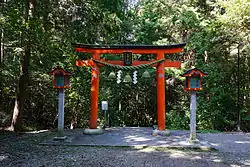鳥居
Japanese
| Kanji in this term | |
|---|---|
| 鳥 | 居 |
| とり Grade: 2 |
い Grade: 5 |
| kun’yomi | |
Etymology
Compound of 鳥 (tori, “bird”) + 居 (i, “abode”).[1][2] From old legends about birds possessed by kami and sitting on tree branches.[1]
First cited to a text from 922 CE.[1]
Noun
Descendants
References
- Shōgaku Tosho (1988) 国語大辞典(新装版) [Unabridged Dictionary of Japanese (Revised Edition)] (in Japanese), Tōkyō: Shogakukan, →ISBN
- Matsumura, Akira, editor (2006), 大辞林 [Daijirin] (in Japanese), Third edition, Tōkyō: Sanseidō, →ISBN
- NHK Broadcasting Culture Research Institute, editor (1998), NHK日本語発音アクセント辞典 [NHK Japanese Pronunciation Accent Dictionary] (in Japanese), Tōkyō: NHK Publishing, →ISBN
This article is issued from Wiktionary. The text is licensed under Creative Commons - Attribution - Sharealike. Additional terms may apply for the media files.
